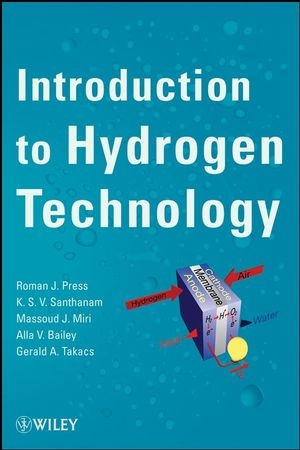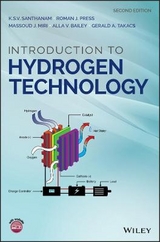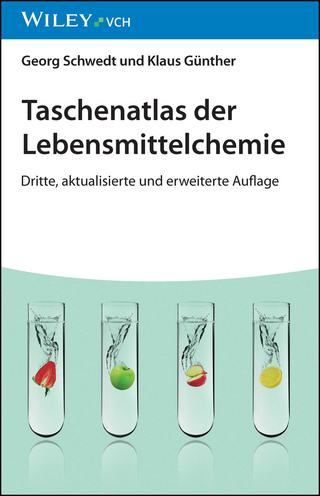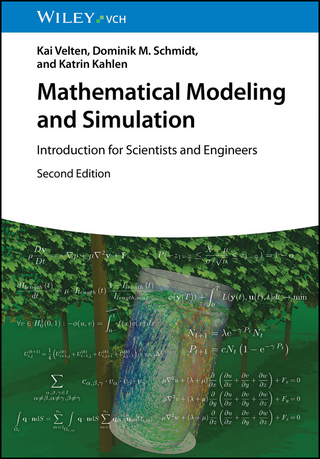
Introduction to Hydrogen Technology
Wiley-Blackwell (an imprint of John Wiley & Sons Ltd) (Verlag)
978-0-471-77985-8 (ISBN)
- Titel erscheint in neuer Auflage
- Artikel merken
Introduction to Hydrogen Technology explains the basic chemistry that underlies promising, innovative new technologies such as hydrogen fuel cells. Incorporating information on the latest developments and current research on alternative energy sources, this book:
Covers chemistry fundamentals relating to hydrogen technology, including reversible reactions and chemical equilibrium, acid–base chemistry, thermodynamics, reaction kinetics, electrochemistry, organic reactions involving hydrogen, polymer chemistry, photochemistry, and plasma chemistryDiscusses various types of hydrogen fuel cells and diverse fuel cell applicationsAddresses the production techniques and the infrastructure necessary to support hydrogen–based energy sources This is a hands–on resource for scientists and researchers working with hydrogen–based technologies and an excellent reference for students in engineering, science, environmental science, and applied science and technology. This book also will be useful for the general public interested in sustainable energy.
The authors of this book are members of the Rochester Institute of Technology Renewable Energy Enterprise (RITree). It is their hope that this book will spur new developments in hydrogen–based energy sources for today′s world and tomorrow′s. ROMAN J. PRESS is a former distinguished researcher at the Rochester Institute of Technology (RIT), where his work involved hydrogen applications and the use of renewable energy. He holds twenty–six patents and has authored numerous publications. His industrial experience includes work at General Motors, Delphi, and Quantum Technologies. K. S. V. SANTHANAM is a Professor in RIT′s Department of Chemistry and the Director of the Center for Materials Science and Engineering, a member of RIT′s Task Force on Nanotechnology, and an affiliated faculty member of the Golisano Institute for Sustainability. He is an elected corresponding member of Sachsische Akademie der Wissenschaften zu Leipzig, and a member of the American Chemical Society, Materials Research Society, and the Electrochemical Society. MASSOUD J. MIRI is a Professor in the Department of Chemistry and the Center for Materials Science and Engineering at RIT. He is a member of the American Chemical Society (including its Division of Polymer Chemistry, POLYED Committee, and Division of Polymeric Materials Science and Engineering), and a member of the Sigma Xi Research Society. ALLA V. BAILEY is a faculty member in the Department of Chemistry at RIT; formerly the principal researcher at Plastpolymer company in St. Petersburg, Russia. She holds forty patents, has authored numerous scientific publications, including three books, and holds the highest scientific degree in Europe, D.Sci. GERALD A. TAKACS is Professor of Chemistry, a member of the materials science and engineering graduate faculty, an extended faculty member in microsystems engineering, and an affiliated faculty member of the Golisano Institute for Sustainability.
Preface.
Chapter 1. Available Energy Sources.
1.1 Civilization and search for sustainable energy.
1.2 Planet energy resources and energy consumption.
1.3 Greenhouse effect and its influence on quality of life and ecosphere.
1.4 Non–renewable energy sources.
1.5 Renewable energy sources:
1.6 Energy storage.
1.7 Energy ethics.
Chapter 2. Chemistry Background.
2.1 Reversible reactions and chemical equilibrium.
2.2 Acid–base chemistry.
2.3 Thermodynamics.
2.4 Reaction kinetics.
2.5 Electrochemistry (Oxidation/Reduction Reactions).
2.6 Organic reactions involving hydrogen.
2.7 Polymer chemistry.
2.8 Photochemistry.
2.9 Plasma chemistry.
Chapter 3. Hydrogen Properties.
3.1 Occurrence of hydrogen, properties and use.
3.2 Hydrogen as energy carrier.
3.3 Comparison to other fuels.
3.4 Hydrogen storage.
Chapter 4. Hydrogen Technology.
4.1 Production:
4.2 Hydrogen infrastructure.
4.3 Hydrogen safety.
4.4 Hydrogen technology assessment.
Chapter 5. Fuel Cells Essentials.
5.1 Introduction to hydrogen based fuel cells.
5.2 Proton exchange membrane.
5.3 Solid oxide fuel cells.
5.4 Alkaline fuel cells.
5.6 Stack, catalysts, electrode assembly.
5.7 Medium and high temperature fuel cells.
5.8 Fuel cells system architecture.
Chapter 6. Fuel Cells Applications.
6.1 Stationary power production.
6.2 Transportation.
6.3 Micro–power systems.
6.4 Mobile and residential power systems.
6.5 Space and military applications.
6.6 Conclusion.
Index.
| Verlagsort | Chicester |
|---|---|
| Sprache | englisch |
| Maße | 184 x 253 mm |
| Gewicht | 740 g |
| Themenwelt | Naturwissenschaften ► Chemie |
| Technik ► Elektrotechnik / Energietechnik | |
| ISBN-10 | 0-471-77985-7 / 0471779857 |
| ISBN-13 | 978-0-471-77985-8 / 9780471779858 |
| Zustand | Neuware |
| Informationen gemäß Produktsicherheitsverordnung (GPSR) | |
| Haben Sie eine Frage zum Produkt? |
aus dem Bereich



